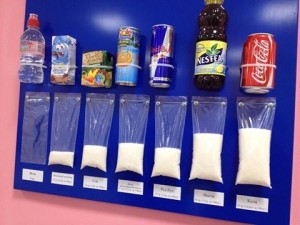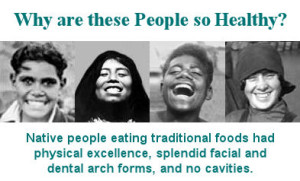Dentists agree that Sugar is the underlying issue causing tooth decay
Fluoride Free NZ agrees with Dentist Dr Rob Beaglehole that sugar is the main contributor to not only the tooth decay issue in New Zealand but also its impact on other diseases. Dr Beaglehole aired his views on sugar on Sunday’s programme on 7 March 2015
Rob Beaglehole: “It doesn’t matter if your sugary drink is Coke, Chocolate milk or even Organic Juice it will still rot your teeth, contribute to type-2 diabetes and obesity“.
Sunday: “How do you know sugar is responsible?”
RB: “Well we’ve talked to the mother about what the child has been eating and drinking. She’s indicated that there was a diet high in sugary drinks”.
Discussing another case:
Sunday: “She must have been getting a lot of sugar”.
RB: “Yeah, she was getting it in the baby bottle“.
Fluoride Free NZ does not however endorse Beaglehole’s views on water fluoridation.
Of course, sugar does not just effect our teeth. Everything we consume, including fluoridated water, effects ever part of our body. See The Negative Effects of Sugar
Green Party agree that sugar is the cause of tooth decay
Green Party health spokesperson Kevin Hague agreed on Radio New Zealand’s Morning Report programme on 10 April that sugar is the culprit. He said sugary drinks, and hidden sugars, were causing tooth decay, and the Government should put a tax on them.
Fluoride Free NZ does not however endorse Hague’s views on water fluoridation.
World Health Organisation supports reduction in sugar intake
Adults and children must cut the amount of sugar they consume by as much as half in North America and Western Europe and even more in other areas to lower risk of obesity and tooth decay, the World Health Organization.
The WHO’s recommendations to health ministries cover free sugars such as glucose and fructose, and sucrose or table sugar added to processed foods and drinks as well as sugar naturally present in honey, syrups and fruit juices.
“We have solid evidence that keeping intake of free sugars to less than 10% of total energy intake reduces the risk of overweight, obesity and tooth decay,” Dr. Francesco Branca, Director of WHO’s Department of Nutrition for Health and Development said in a statement.
Statistics on sugar in New Zealand
- New Zealanders, on average, consume about 54 kilograms of sugar per year. That is equivalent to 37 teaspoons of sugar per person per day.
- A can of fizzy drink (355 millilitres) could contain up to 10 teaspoons, or 40 grams, of sugar.
- The World Health Organisation recommends reducing daily intake to 6 teaspoons of sugar. At 4 grams per teaspoon that is a miserly 24 grams of sugar or ≤10 % of energy intake
- Other recent research suggest vastly lower amounts of sugar intake. “The recommendation that sugar intakes should be ≤10 % of energy intake is no longer acceptable. The much greater adult burden of dental caries highlights the need for very low sugar intakes throughout life, e.g. 2-3 % of energy intake, whether or not fluoride intake is optimum.”
Associate Health Minister Peter Dunne on Sugar
The Associate Health Minister Peter Dunne shared the governments official line on sugar consumption on the current affairs Programme Sunday on the 7th of March 2015.
Peter Dunne made the extraordinary statement that sugar is not the main problem associated with tooth decay in response to calls from dentists to have a tax on sugar.
Sunday “Peter Dunne says the answer to our oral health problems could lie in more education and fluoridation.”
PD: “We are certainly looking at that (fluoridation) because we know from the evidence that it works.”
Sunday “But doesn’t it all start with sugar?”
PD: “No it doesn’t start with sugar”
PD: “I don’t think we are addicted to sugar. I don’t think it is a good thing that we consume that amount of sugar per capita but I don’t think that we can put a tax on sugary drinks and it all goes away”.
Read the entire transcript of Peter Dunne’s ignorant comments.
Dentists speak out against Peter Dunne’s Ignorance
Peter Dunne’s comments are completely out of line with the recent WHO publication, Guideline: Sugars intake for adults and children. Geneva: World Health Organization; 2015 which, happens to be peer reviewed by the Otago Dental School’s very own Murray Thomson.
Dentist Dr Stan Litras highlighted the dismissive and ignorant point of view of Peter Dunne in the Fluoridation Information Network of Dentist’s press release.
“The WHO report should be of interest to the Associate Minister of Health, Peter Dunne, who recently denied that sugar is the underlying cause of tooth decay, and who seems to believe water fluoridation is a magic bullet which will protect at risk people from tooth decay regardless how much sugar they consume in the way of fizzy drinks and fast food.”
Dr Litras continues to point out that fluoridation is not the panacea.
“Newly published guidelines from the World Health Organization recommend a reduction of sugar intake to below 10 percent of daily energy intake, in order to reduce tooth decay, and other diseases, particularly in children. The report confirms that high sugar is related to increased decay in both fluoridated and non-fluoridated areas, and that while water fluoridation appears to delay tooth decay, it does not completely prevent it”.
In the WHO publication, Guideline: Sugars intake for adults and children, they state that “Although exposure to fluoride reduces dental caries at a given age, and delays the onset of the cavitation process, it does not completely prevent dental caries, and dental caries still progresses in populations exposed to fluoride”
Is Peter Dunne really the right person to be the Associate Minister of Health if he cannot or will not acknowledge Sugar’s harmful impact on New Zealand’s health?
Tooth Decay Solution
Consistent calls have been made for the Health Department to fight tooth decay by focusing on reducing sugars in the diet and improving tooth brushing compliance in children.
Water fluoridation is not the answer to tooth decay. The solution is to promote dental hygiene education, a good diet and regular visits to the dentist. We need to reduce sugar consumption.
Reduce sugar consumption
Help to Reduce Your Sugar Consumption
If you would like to learn more about reducing your own sugar intake, see the resources below:
Sugar substitutes
- Stevia – a highly sweet herb derived from the leaf of the South American stevia plant, is sold as a supplement. It’s completely safe in its natural form and can be used to sweeten most dishes and drinks.
- Lo Han Guo (also spelled Luo Han Kuo)
- Dr Mercola on Sugar Substitutes — What’s Safe and What’s Not
(If you know of any other links to good advice on reducing your sugar consumption please let us know)
Tips to reduce sugar consumption
- Tips to reduce sugar – Edgar Diabetes and Obesity Research
- Sugar Block from Go Healthy
- Chromium
(If you know of any other links to good advice on reducing your sugar consumption please let us know)
Fluoride Free NZ provides this information for your convenience and follow-up. Fluoride Free NZ does not hold a view as to the quality or performance of any specific brand.
Sugar in the NZ Media
- Sugar: The Bitter Truth. Dr Robert Lustig
- Going sugar-free – how hard can it be? Campbell Live 23 April 2014
- Nigel Latta asks: Is sugar the new fat? Breakfast. 3 September 2014 TVNZ
- Miriama Kamo: I’m a sugar addict Sunday 5 March 2015 TVNZ
- Sunday Extra – How much sugar do you eat? Sunday 6 March 2015 TVNZ
- Bittersweet – One man’s mission to get rid of our sweet tooth. 7 March 2015 TVNZ
- That Sugar Film
- Damon Gameau: sugar surfeit Saturday 4 April 2015 National Radio
Organisations and Individuals pushing to reduce sugar consumption
- FIZZ
- Garden to Table
- Heart Foundation
- NZ Sugar Free
- Safe Food Campaign
- That Sugar Film
- The Truth About Cancer Organisation – highlights the harmful impact on sugar of Cancer patients
(If you know of any other organisations or individuals working to reduce New Zealand’s addiction to sugar please let us know).
Alternative Ideas to reduce sugar consumption
- Larger educational campaign
- Labelling of sugar rich products marketed to children – warnings/pictures on labels regarding
- Removing accessibility of sugar products in schools – Example of excellent results: Central Alternative High School. Appleton, Wisconsin.
- Removing accessibility of sugar products at hospitals, council buildings and government buildings – Dr Beaglehole has had some success with this.
Dr Beaglehole – Right on sugar, wrong on fluoridation
Sugar Industry and Collusion with Health Departments
A recent peer reviewed study, Sugar Industry Influence on the Scientific Agenda of the National Institute of Dental Research’s 1971 National Caries Program: A Historical Analysis of Internal Documents, has shed light on the close relationship between the sugar industry and public health.
The study’s author compares sugar industry tactics to that of the tobacco industry. Stanton Glantz, PhD, is famous for his work revealing the lies of the tobacco industry regarding health effects, says, “These tactics are strikingly similar to what we saw in the tobacco industry in the same era. Our findings are a wake-up call for government officials charged with protecting the public health, as well as public health advocates, to understand that the sugar industry, like the tobacco industry, seeks to protect profits over public health. The sugar companies, in criticizing what we did, haven’t said we’ve said anything wrong or that we’ve misunderstood and misrepresented anything. They’re saying ‘Oh, this is a long time ago, what difference does it make,’ — and that’s exactly what the tobacco industry said.”
“This historical example illustrates how industry protects itself from potentially damaging research, which can inform policy makers today. While it may be valuable in theory for the industry to contribute data about their products to the research community, industry should not have the opportunity to influence public health research priorities [94]. Regulatory science to support sensible and defensible policies to limit added sugar consumption was not pursued in the 1970s because of the alignment of the NIDR’s research priorities with those of the sugar industry. Actions taken by the sugar industry to impact the NIDR’s NCP research priorities, which echo those of the tobacco industry, should be a warning to the public health community. The sugar industry’s current position—that public health recommendations to reduce dental caries risk should focus on sugar harm reduction as opposed to sugar restrictions—is grounded in more than 60 years of protecting industry interests. Industry opposition to current policy proposals—including a WHO guideline on sugars proposed in 2014 and changes to the nutrition facts panel proposed in 2014 by the FDA—should be carefully scrutinized to ensure that industry interests do not supersede public health goals.”
Study summary
In 1966, the National Institute of Dental Research (NIDR) began planning a targeted research program to identify interventions for widespread application to eradicate dental caries (tooth decay) within a decade. In 1971, the NIDR launched the National Caries Program (NCP). The objective of this paper was to explore the sugar industry’s interaction with the NIDR to alter the research priorities of the NIDR NCP.
The NCP was a missed opportunity to develop a scientific understanding of how to restrict sugar consumption to prevent tooth decay. A key factor was the alignment of research agendas between the NIDR and the sugar industry. This historical example illustrates how industry protects itself from potentially damaging research, which can inform policy makers today. Industry opposition to current policy proposals—including a World Health Organization guideline on sugars proposed in 2014 and changes to the nutrition facts panel on packaged food in the US proposed in 2014 by the US Food and Drug Administration—should be carefully scrutinized to ensure that industry interests do not supersede public health goals.
This study highlights that we should be extremely wary of the relationship between industry and public health. We have every right to demand an open transparent discussion and debate on supposed public health initiatives like water fluoridation.
View the University of California San Francisco’s press release on the article.
- View additional commentary on the article in the PLOS Medicine Blog.
The PLOS Medicine article has received significant media coverage, including articles by:
The Sugar Industry and fluoridation policy
The connection between the sugar industry and fluoridation policy was also previously discussed in the book “The Case Against Fluoride” on pages 263-65:
“In 1949, one year before the U.S. Public Health Service endorsed fluoridation, the director of the Sugar Research Foundation, a lobby representing about 130 sugar interests, said that its research mission was ‘to find out how tooth decay could be controlled effectively without restriction of sugar intake.’ For the sugar lobby, fluoride—delivered through the water supply—quickly became the magic bullet to achieve that goal. From the earliest days of fluoridation, considerable sums of money were paid to prominent fluoride researchers at leading American universities.”
Read details of the book, the Case Against Fluoride or check your local library for a copy to read.
Is Fluoride effective against Sugar?
Recent research (A new understanding of the relationship between sugars, dental caries and fluoride use: implications for limits on sugars consumption. Sheiham A1, James WP2.) examined the relationship between sugar intake and the progressive development of dental caries.
They found that caries occurred in both resistant and susceptible teeth of children when sugar intakes were only 2-3 % of energy intake, provided that the teeth had been exposed to sugars for >3 years. Despite increased enamel resistance after tooth eruption, there was a progressive linear increase in caries throughout life, explaining the higher rates of caries in adults than in children. Fluoride affects progression of caries development but there still is a pandemic prevalence of caries in populations worldwide.
The authors concluded that “Previous analyses based on children have misled public health analyses on sugars. The recommendation that sugar intakes should be ≤10 % of energy intake is no longer acceptable. The much greater adult burden of dental caries highlights the need for very low sugar intakes throughout life, e.g. 2-3 % of energy intake, whether or not fluoride intake is optimum.”
Meaning that even the WHO’s latest recommendation of 10%s still far too high.
Weston A Price’s Research on Nutrition and Dental Health
People had perfect and beautiful teeth around the world before the introduction of modern diets with refined sugars and processed foods. Dr Weston A. Price was a dentist who spent many years researching dental health and nutrition in the 1930s around the world. Dr Price studied Maori and many other populations before the introduction of commercialised foods. Dr Price studied three Maori iwi who were still eating their traditional diet and found they had perfect teeth and were exceptionally healthy.






